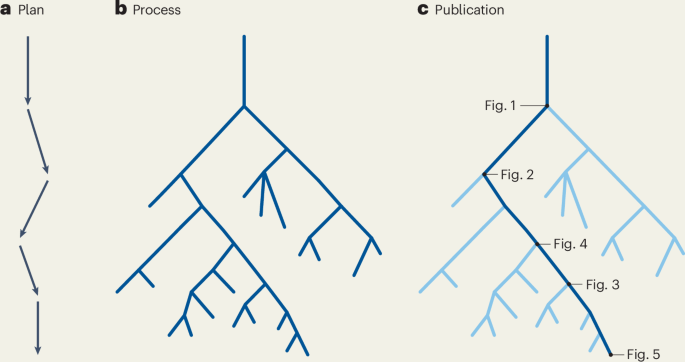- Correspondence
- Published:
(2025)Cite this article
Subjects
In reality, research projects grow through an evolutionary process. Variation — the substrate of evolution — is provided through the emergence of new questions and avenues of investigation. The research team must then choose which directions to pursue, a process akin to natural selection1. Along with this evolution at the macro-scale, a much more orderly process is required at the micro-scale. Within each step, thoughtful study design leads to robust experiments and analyses. This complementarity between evolution and design best encapsulates the process of discovery: in ‘night science’ we evolve ideas for the next step, while ‘day science’ tests them2.
A project’s evolutionary history is generally obscured in the resulting scientific publication. The publication’s function is to justify and communicate the project’s main results; it is not a historical account. Instead of recounting all of the project’s dried-up branches, publications zoom in on a single lineage in its evolution: the steps that led to the most interesting result (Fig. 1c). Publications typically describe the discovery as it ideally should have happened, reporting only the evidence relevant to the proposed claims3.
This is a preview of subscription content, access via your institution
Access options
Access Nature and 54 other Nature Portfolio journals
Get Nature+, our best-value online-access subscription
24,99 € / 30 days
cancel any time
Subscribe to this journal
Receive 12 print issues and online access
195,33 € per year
only 16,28 € per issue
Buy this article
- Purchase on SpringerLink
- Instant access to full article PDF
Prices may be subject to local taxes which are calculated during checkout

References
-
Simonton, D. K. Creat. Res. J. 35, 304–323 (2023).
-
Yanai, I. & Lercher, M. Genome Biol. 20, 179 (2019).
-
Howitt, S. M. & Wilson, A. N. EMBO Rep. 15, 481–484 (2014).
-
DeYoung, C. G., Quilty, L. C. & Peterson, J. B. J. Pers. Soc. Psychol. 93, 880–896 (2007).
-
DeYoung, C. G. J. Res. Pers. 56, 33–58 (2015).
-
Kaufman, J. C. & Sternberg, R. J. The Cambridge Handbook of Creativity (Cambridge Univ. Press, 2019).
-
Feist, G. J. Pers. Soc. Psychol. Rev. 2, 290–309 (1998).
-
Feist, G. J., Reiter-Palmon, R. & Kaufman, J. C., eds. Cambridge Handbooks in Psychology: The Cambridge Handbook of Creativity and Personality Research (Cambridge Univ. Press, 2017).
-
Roberts, B. W. & Mroczek, D. Curr. Dir. Psychol. Sci. 17, 31–35 (2008).
-
Dweck, C. S. Mindset: The New Psychology of Success (Random House, 2007).
-
King, S. On Writing: A Memoir of the Craft (Simon and Schuster, 2020).
-
Yanai, I. & Lercher, M. J. Nat. Biotechnol. 42, 18–19 (2024).
Acknowledgements
We thank Gustavo S. França for assistance with the figure and James C. Kaufmann, Judith Berman, Amir Mitchell and Yoav Gilad for critical comments.
Ethics declarations
Competing interests
The authors declare no competing interests.
Rights and permissions
About this article
Cite this article
Yanai, I., Lercher, M.J. Openness guides discovery.
Nat Biotechnol (2025). https://doi.org/10.1038/s41587-025-02635-7
-
Published:
-
DOI: https://doi.org/10.1038/s41587-025-02635-7
























